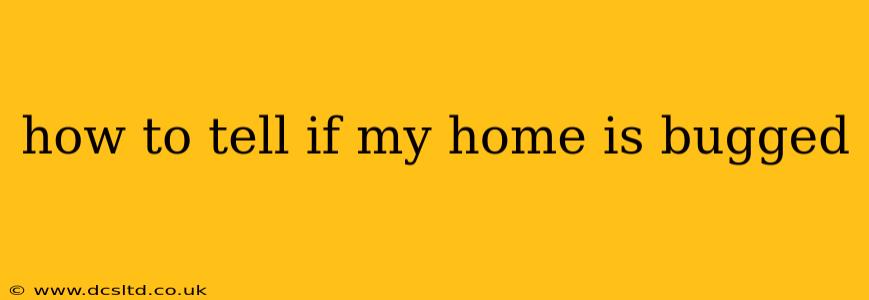How to Tell if Your Home is Bugged: A Comprehensive Guide
The unsettling feeling of being watched, unheard conversations seemingly known, or strange electronic noises can trigger significant concern. Discovering if your home is bugged requires a methodical approach, combining observation with technological know-how. This guide will help you assess potential threats and take appropriate action.
What are the common signs of a bugged home?
This is a crucial question many people ask. Signs of a bugging device can be subtle, but persistent observation can reveal them. Look for:
- Unexplained Electronic Noises: Static, clicks, or buzzing sounds, especially when no electronic devices are operating, could indicate a listening device.
- Unusual Activity: Notice unexplained lights flickering, doors slightly ajar, or objects out of place? These could indicate unauthorized entry.
- Strange Phone Behavior: Your phone may experience unexpected drops in signal strength or strange connection issues in specific areas of your home.
- Suspicious Devices: Unfamiliar devices, especially small, easily concealed objects, warrant careful inspection. Look for anything out of place, particularly near phones, computers, or electrical outlets.
How can I find hidden bugs in my house?
Locating hidden bugs requires careful searching and the use of some simple tools. Here's a step-by-step approach:
-
Visual Inspection: Begin with a thorough visual search of your home. Focus on areas easily accessible to intruders, such as windows, doors, and electrical outlets. Check behind furniture, pictures, and mirrors.
-
Use a Flashlight: A flashlight can help illuminate hard-to-see areas and highlight any unusual objects.
-
Check for Wireless Signals: Many listening devices use Wi-Fi or Bluetooth. A mobile phone or tablet app capable of detecting these signals can help locate hidden bugs. (Note: this requires some technical understanding.)
-
Sweep for RF Signals: A professional-grade RF (radio frequency) detector is the most effective way to find hidden bugs. These devices detect the signals emitted by many surveillance devices. Consider renting or hiring a professional with such equipment.
-
Inspect Common Hiding Spots: Pay special attention to common hiding spots like smoke detectors, clocks, lamps, power adapters, and even picture frames.
What types of bugging devices should I look out for?
Bugging devices come in various shapes and sizes. Some are highly sophisticated, while others are relatively simple. Here are some common types:
- Hidden Cameras: These can be disguised as everyday objects, such as smoke detectors, pens, or even buttons.
- Voice-Activated Recorders: These devices record conversations only when triggered by a specific sound.
- Wireless Bugs: These devices transmit audio signals over Wi-Fi or Bluetooth.
- GPS Trackers: While not strictly for listening, GPS trackers can reveal the location of your phone or vehicle.
What should I do if I find a bug in my home?
If you discover a bugging device, do not touch it. Contact the authorities immediately. The police can secure the device for forensic analysis and investigate the potential intrusion.
How much does it cost to have a professional bug sweep done?
The cost of a professional bug sweep varies depending on the size of your home and the level of detail required. A basic sweep might cost a few hundred dollars, while a more comprehensive investigation could be several thousand.
How can I protect my home from being bugged?
Prevention is key. Here are some measures to deter unwanted surveillance:
- Regular Inspections: Regularly check your home for anything suspicious.
- Secure Entry Points: Ensure all doors and windows are securely locked.
- Strong Passwords: Change all passwords to access devices regularly.
- Privacy Settings: Adjust privacy settings on all electronic devices.
- Professional Security System: Consider installing a professional security system with motion detectors and cameras.
This comprehensive guide provides a solid foundation for understanding how to detect and prevent bugging in your home. Remember, if you suspect your home is bugged, it's crucial to act swiftly and carefully, consulting with the appropriate professionals to ensure your safety and security.
